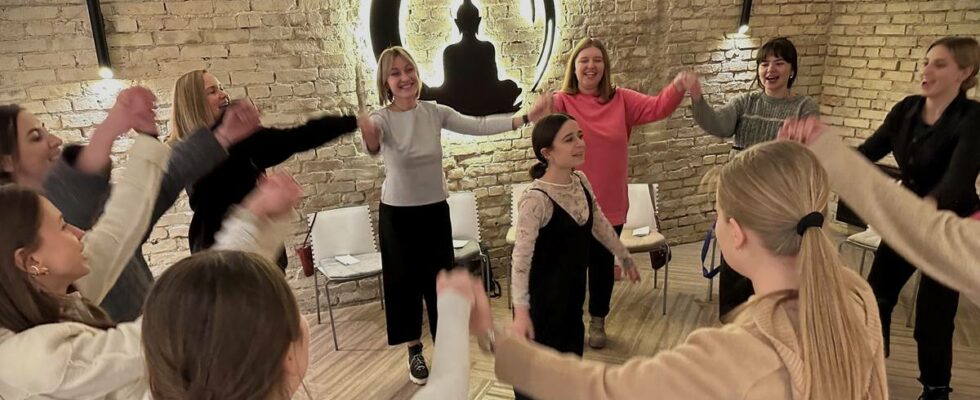In a basement in Kyiv, 12 women have lined up in a ring. In the middle stands course leader Marisjka Shtyrbulova. – Say after me: ja-je-ji-jo. The sounds fill the room. The goal is perfect Ukrainian pronunciation. One of the course participants is Marina (28). She grew up speaking Russian, but decided to stop on the day Russia invaded Ukraine on 24 February 2022. PRONUNCIATION: – Ukrainian has several difficult sounds, says Marina (28). She grew up speaking Russian, but now her goal is to learn perfect Ukrainian pronunciation. Photo: kari skeie / rk – I want to improve in Ukrainian. Since I grew up speaking Russian, my Ukrainian has major shortcomings. There are many words I don’t know. I also have to work on my pronunciation, says Marina. The struggle for language Language has become an important part of the resistance struggle in Ukraine. In the capital Kyiv, a majority of citizens spoke Russian before the war, but this is changing. In a 2022 survey, 33 percent of Kyiv residents said they had switched to Ukrainian after the full-scale invasion. Marisjka Shtyrbulova says interest in her courses increased sharply soon after the Great War broke out. She believes that the course evenings also help to strengthen the fighting morale of the participants. – We feel that what we do together is important for our country. Learning the language and getting better at Ukrainian is something that means a lot to us, she says. Language policy in Ukraine The relationship between Ukrainian and Russian has been an important issue since Ukraine became independent in 1991. After the Orange Revolution in 2004, President Viktor Yushchenko pursued an active Ukrainianization policy. The aim was to strengthen the role of the Ukrainian language in education, media and state administration. President Viktor Yanukovych introduced a new language law in 2012 which placed increased emphasis on securing the rights of Russian speakers. For example, Russian was to be given the status of regional administration language in areas where at least 10 percent of the population defined Russian as their mother tongue. Following the 2014 Maidan uprising, a process was initiated to repeal the 2012 language law. Russia’s annexation of Krym and the Russian-led occupation of areas in Donetsk and Luhansk led to a policy of protecting the Ukrainian language. In the new language law that was adopted in 2019 (under President Petro Poroshenko), a step-by-step implementation and escalation of Ukrainian in various areas of society was planned. The education reforms from 2017 went in the same direction, with increased incentives and orders for the use of Ukrainian as the language of instruction, with some differentiation between the various minority languages. In a survey from November 2021, 78 percent of the population answered that Ukrainian was their mother tongue, while 18 percent answered Russian. Source: snl.no Chat clubs Most Ukrainians who grew up speaking Russian understand Ukrainian. But starting to speak Ukrainian can be difficult for many. Ukrainian authorities therefore organize so-called chat clubs around the capital. CHAT CLUB: Ukrainians whose mother tongue is Russian join chat clubs to practice Ukrainian. Photo: Kari Skeie / news For Konstantin (51), this has become an important offer. Every week he goes to the local library where he meets like-minded people. GUESSING GAME: Konstantin (51) has decided to learn Ukrainian after speaking Russian all his life. One of the activities is playing Card Skull in Ukrainian. Photo: Kari Skeie / news Here he can try and fail without it being scary. – It was time for me to learn Ukrainian properly. Coming here is a good offer, says Konstantin. Will not stop speaking Russian But not everyone wants to change languages. Danil (21) was born and raised in a Ukrainian family in Kyiv. At his home, they always spoke Russian. He dreams of becoming a rap artist, but now new language rules in the capital can put an end to the plan. RUSSIAN: Danil (21) is no longer allowed to rap in Russian in the Ukrainian capital. Photo: Torstein Georg Bøe / news Earlier this year, the politicians in Kyiv decided that cultural events can no longer be in Russian. It was bad news for Danil. Previously, he performed his raps at so-called open mic events. Now he no longer has any stage to stand on. – I understand why the rules have been introduced, but I disagree. People like me no longer have the opportunity to express ourselves. We are canceled and boycotted in society. He says he is just as good a Ukrainian, although he wants to keep his mother tongue. – Russian is the language in which I express myself best, he says. Necessary to limit Russian Vadim Vasilovich is a politician in the city council of Kyiv. He is one of those behind the new rules. Although the capital has many Russian-speaking residents, it is absolutely necessary to limit the Russian language in society, he believes. NEW RULES: Vadim Vasilovich sits on the Kyiv city council. He believes it is right to ban cultural events in Russian. Photo: Torstein Georg Bøe / news – Russia claims that the areas where Russian is spoken belong to Russia, Vasiljovich says. – We do not want Russian cultural events to be used as a weapon on the same level as the bullets from Russian soldiers. We are a young nation and we must support our own language. The new rules are a temporary measure, but will apply as long as necessary, according to Vasiljovich.
ttn-69
Ukrainians stop speaking Russian and sign up for language courses to improve their Ukrainian – news Urix – Foreign news and documentaries

